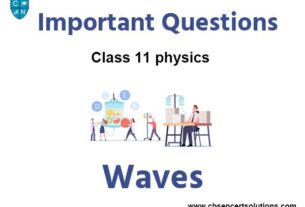Students can read the important questions given below for Locomotion and Movement Class 11 Biology. Locomotion and Movement Class 11 Notes and questions with solutions have been prepared based on the latest syllabus and examination guidelines issued by CBSE, NCERT and KVS. You should read all notes provided by us and Class 11 Biology Important Questions provided for all chapters to get better marks in examinations. Class 11 Biology Question Bank Class 11 is available on our website for free download in PDF.
Important Questions Locomotion and Movement Class 11 Biology
Objective Questions
Question. Match the following
A. A-band
B. I-band
C. Sarcomere
D. H-zone
E. Myosin
F. Actin, troponin, tropomyosin

Options :
(a) A–V, B–IV, C–VI, D–VII, E–II, F–III, G–I
(b) A–V, B–IV, C–III, D–VII, E–II, F–I, G–VI
(c) A–V, B–IV, C–VI, D–VII, E–III, F–I, G–II
(d) A–V, B–IV, C–VI, D–I, E–II, F–III, G–II
Answer
C
Question. Which of the following statements about the molecular arrangement of actin and myosin in myofibrils is false?
A. Each actin (thin filament) is made of 2F (filamentous) actin
B. F-actin is the polymer of G (globular) actin
C. 2F-actins are twisted into a helix
D. Two strands of tropomyosin lie in the grooves of F-actin
E. Troponin forms the head of the myosin molecule
F. The myosin is a polymerised protein
Options :
(a) A,C,G
(b) Only G
(c) Only F
(d) Only C
Answer
C
Question. The Cross bridges of Sarcomere in skeletal muscle is made up of
(a) Actin
(b) Myosin
(c) Troponin
(d) Mysin
Answer
B
Question. Tropomyosin is moved by which of the following proteins
(a) Calmodulin
(b) Actin
(c) Troponin
(d) Acetylcholine
Answer
C
Question. Following is the figure of actin filaments

(a) A-tropomyosin, B-troponin, C-F-actin
(b) A-troponin, B-myosin, C-tropomyosin
(c) A-troponin, B-tropomyosin, C-myosin
(d) A-troponin, B-tropomyosin, C-F-actin
Answer
D
Question. Which of the following statement is correct?
(a) Cytoplasmic streaming helps in pseudopodia formation or amoeboid movement
(b) Cytoplasmic streaming is caused by contraction of microfilament
(c) Both (a) and (b)
(d) Locomotion is not a voluntary movement
Answer
C
Question. Which of the following statements is false?
(a) Locomotion and many other movements require coordinated muscular activities
(b) Muscle is a specialized tissue of endodermal origin
(c) There are about 639 muscles which contributes about 40-50% of adult body weight
(d) Muscles show contractiblity, excitability and conductivity
Answer
B
Question. Which of the following statements about visceral muscles is correct?
(a) They are non-striated muscles
(b) They are voluntary muscles
(c) They are primarily involved in locomotory actions
(d) All
Answer
A
Question. Which of the following statement is false?
(a) Smooth muscles are found in urinary bladder, alimentary canal and genital tract
(b) A striated muscle is syncytium ( multinucleated)
(c) The cytoplasm of striated muscle is called endoplasm
(d) The plasma membrane and ER of striated muscles are called sarcolemma and sarcoplasmic reticulum respectively
Answer
C
Question. The fascia surrounding a muscle is made up of
(a) Cartilage
(b) Collagenous connective tissue
(c) Adipose tissue
(d) Blood vessels
Answer
B
Question. Myofibrils show altemate dark and light bands in
(a) Cardiac muscles
(b) Smooth muscles
(c) Striped muscles
(d) A and C
Answer
D
Question. Which of the following is smallest one?
(a) Muscle fibre
(b) Myofibril
(c) Actin
(d) Sarcomere
Answer
D
Question. Z-line divides the myofibrils into
(a) Sarcomere
(b) Sarcolemma
(c) Sarcosome
(d) Microtubules
Answer
A
Question. Light bands contain actin and are called
(a) A-bands or isotropic band
(b) A-bands or anisotropic bands
(c) I-bands or isotropic bands
(d) I-bands or anisotropic bands
Answer
C
Question. Which of the following statements about the striated muscles is false?
A. In the centre of each I-band is an elastic fibre (z-line) which bisects it
B. Thin filaments are firmly attached to the Z-line
C. M-line is a fibrous membrane in the middle of A-bands
D. A sarcomere comprises one full A-band and 2 half I-bands
Options :
(a) All
(b) D
(c) A and B
(d) None
Answer
D


